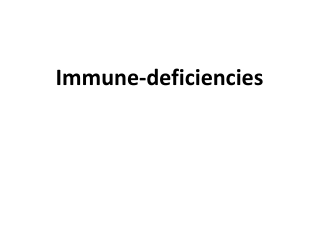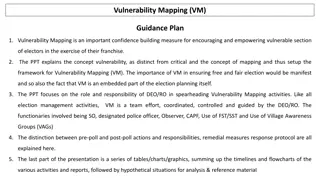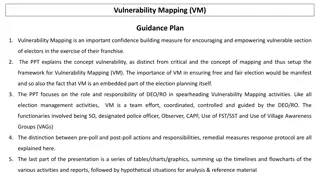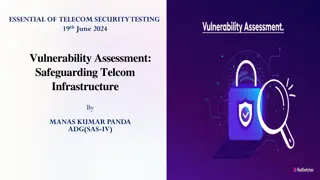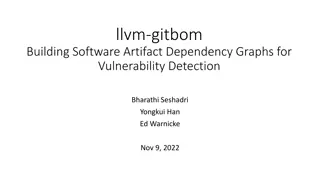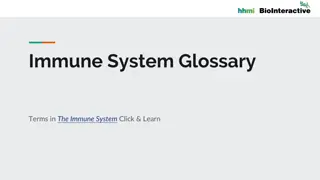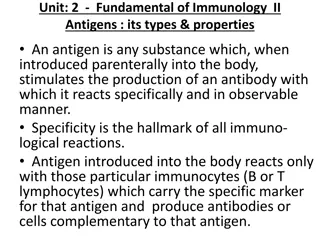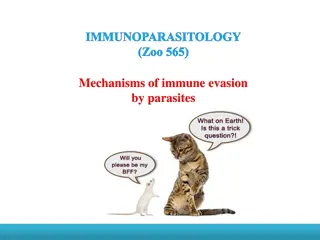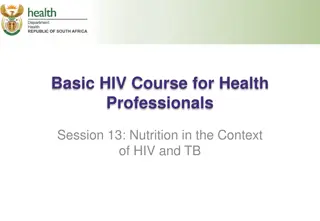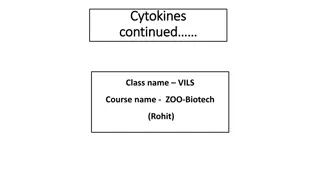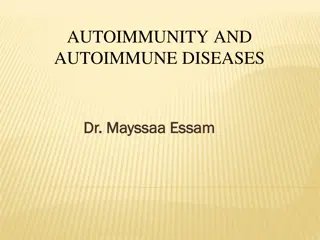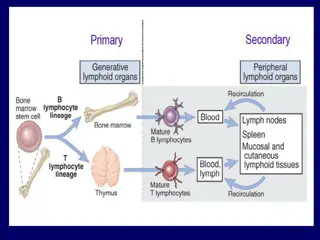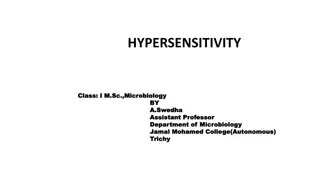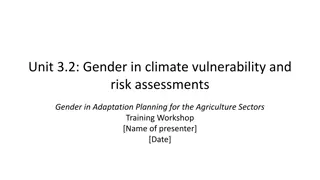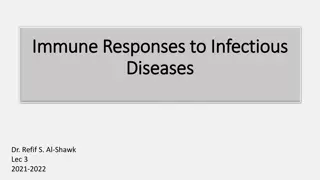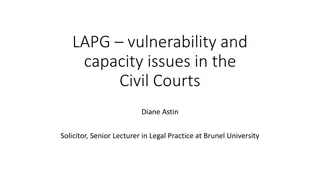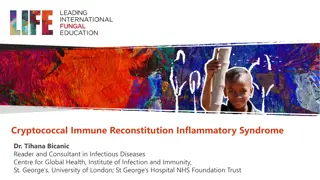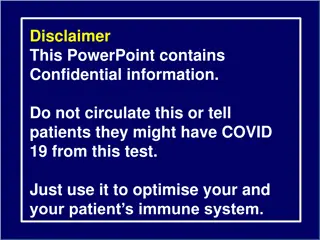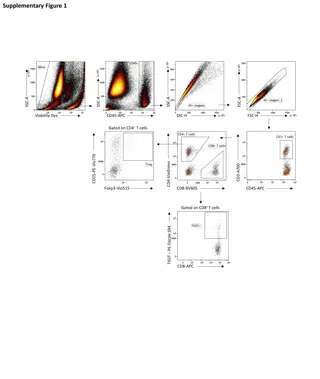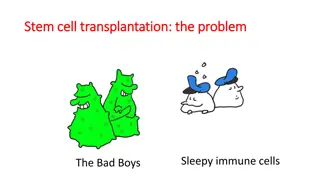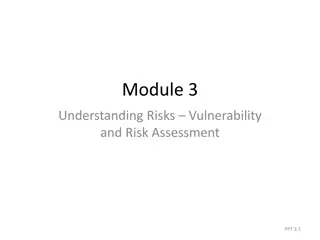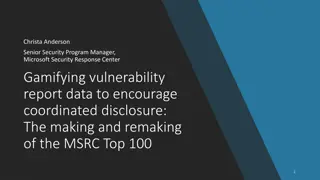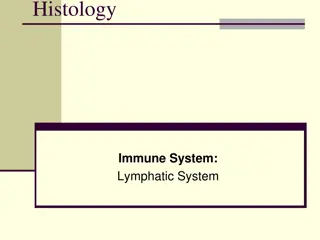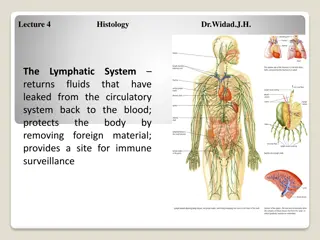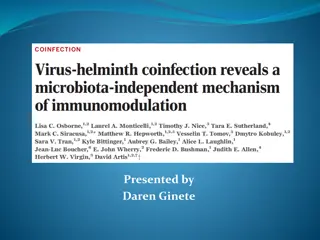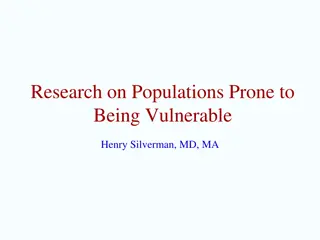Understanding Vulnerability: Meaning, Types, and Factors affecting Vulnerability
This article explores the concept of vulnerability, including its meaning, types (physical and social), and factors that contribute to vulnerability. It discusses the impact of hazardous events on communities, infrastructure, and the environment, and highlights the importance of awareness and prepar
26 views • 31 slides
Immune-deficiencies
Immune deficiencies can be classified into primary hereditary disorders based on clinical presentations, including cell-mediated, antibody-mediated, non-specific, and complement activation deficiencies. Major clinical manifestations of immune disorders range from B-cell deficiencies to phagocytic ce
2 views • 46 slides
Understanding Risk Management in Environmental Geography and Disaster Management
Risk management in environmental geography and disaster management involves assessing the potential losses from hazards, evaluating vulnerability and exposure, and implementing strategies to mitigate risks. It includes calculating risk, dealing with risk through acceptance, avoidance, reduction, or
1 views • 10 slides
Comprehensive Guide to Vulnerability Mapping in Election Planning
Explore the significance of Vulnerability Mapping (VM) in empowering vulnerable voters, understand the concept, role of DEO/RO, and the objective of identifying and addressing voter vulnerability. The presentation emphasizes pre-poll and post-poll actions, remedial measures, and timelines, providing
3 views • 42 slides
Understanding Immune Thrombocytopenia (ITP) and Its Impact
Immune Thrombocytopenia (ITP) is a rare autoimmune disease where the immune system wrongly attacks platelets, leading to low platelet count. It can affect individuals of all ages, with symptoms appearing post-virus, vaccination, or certain medications. ITP can result in fatigue, bruising, and bleedi
3 views • 30 slides
Vulnerability Mapping (VM).Guidance Plan
Vulnerability Mapping (VM) is crucial in empowering vulnerable voters by identifying and addressing potential threats to their exercise of franchise. This guide explains the concept of vulnerability mapping, its role in ensuring free and fair elections, and the responsibilities of election officials
2 views • 42 slides
Understanding Telecom Security Testing: Vulnerability Assessment & Remediation
Telecom security testing is crucial for safeguarding infrastructure against hacks. Learn about vulnerability assessment, common weaknesses, types of vulnerabilities, severity scoring, and automated tools like Nessus and Nexpose. Explore network, web application, and host-based vulnerability testing
0 views • 18 slides
Leveraging Artifact Dependency Graphs for Software Vulnerability Detection
Explore how LLVM-GitBOM utilizes artifact dependency graphs to detect vulnerabilities in software dependencies. The presentation covers the overview of GitBOM, CVE detection, supply chain vulnerabilities, and the importance of precise build tools in vulnerability scanning. Learn about utilizing gito
0 views • 34 slides
Comprehensive Guide to Immune System Glossary Terms
Dive into the world of immune system glossary terms with definitions and visual aids. Explore key concepts such as immune cell activation, adaptive immune response, antibodies, antigens, and more. Understand the complex processes within the immune system through informative images and concise explan
1 views • 70 slides
Understanding the Immune System: Organs, Functions, and Importance
The immune system acts as a defense mechanism against pathogens and infections, comprising various organs, such as the bone marrow, thymus, spleen, white blood cells, antibodies, complement system, and the lymphatic system. It works to recognize and destroy harmful microbes, maintaining the body's h
1 views • 23 slides
Understanding the Vulnerability Index for Small Island Developing States
This article discusses the concept of vulnerability in the context of countries, focusing on Small Island Developing States (SIDS). It explores the differences between vulnerability and poverty, the history of vulnerability index development from SIDS to Least Developed Countries (LDCs), and critiqu
8 views • 44 slides
Understanding Antigens and Immunogens: Types and Properties
Antigens are substances that stimulate the production of antibodies in the body, exhibiting specificity in immune reactions. They interact with immune response products like antibodies, BCRs, and TCRs. Immunogens induce detectable immune responses, leading to antibody production or T cell activation
1 views • 30 slides
Mechanisms of Immune Evasion by Parasites in Immunoparasitology
Understanding how parasites evade the immune system of their hosts is crucial in the field of immunoparasitology. Parasites have developed various strategies such as anatomical seclusion, antigenic variation, and intracellular living to avoid host immune responses. Examples include Plasmodium within
0 views • 26 slides
Importance of Nutrition in the Context of HIV and TB
Malnutrition is common in people living with HIV and TB, exacerbating immune suppression and disease progression. Good nutrition can strengthen the immune system, improve drug adherence, and manage symptoms, while poor nutrition weakens immunity and increases vulnerability to infections. Consequence
2 views • 20 slides
Economic Vulnerability Premium for SIDS - Webinar Insights
Presentation outlines applying Economic Vulnerability Index (EVI) for an Economic Vulnerability Premium in Small Island Developing States (SIDS) during ADF 13 cycle. Details ADF grants availability, grant allocation framework, performance-based allocation system, and modifications needed for SIDS.
0 views • 14 slides
Understanding the Significance of Cytokines in Immune Response
Cytokines play a crucial role in immune response activation and regulation. They are secreted by various cell types like lymphocytes, monocytes, and macrophages, exerting diverse biological functions, including immune system development, inflammatory response induction, and hematopoiesis regulation.
2 views • 12 slides
Understanding Autoimmunity and Autoimmune Disorders
Autoimmunity refers to the immune system's failure to recognize its own cells, leading to attacks on self-tissues. Autoimmune disorders encompass over 80 chronic illnesses where the immune system mistakenly targets organs. These disorders are poorly understood and recognized, impacting various organ
1 views • 20 slides
Immune Response Regulation and Autoimmunity Overview
The immune system maintains a balance through tolerance mechanisms to prevent autoimmunity. Central and peripheral tolerance play crucial roles in immune unresponsiveness to self-antigens. Failure in immune regulation can lead to autoimmune diseases like diabetes and lupus. Vaccination, discovered b
0 views • 18 slides
Understanding Hypersensitivity Reactions in Immunology
Hypersensitivity in immunology refers to an altered immune response against antigens, leading to hyperreactivity and immunopathology. This article delves into the different categories of adaptive hypersensitivities, focusing on Immediate (Type I), Antibody-Mediated Cytotoxic (Type II), and Immune Co
0 views • 6 slides
Gender Considerations in Climate Vulnerability and Risk Assessments for Agriculture
This training workshop explores the intersection of gender, climate vulnerability, and risk assessments in adaptation planning for the agriculture sectors. It delves into how women and men may experience climate change effects differently and discusses ways to ensure gender considerations are includ
0 views • 6 slides
Immune Responses to Parasitic Infections and Evasive Strategies by Protozoan and Helminth Parasites
Parasitic infections pose complex challenges to the immune system due to the diverse nature of parasites, including protozoans and helminths. Protozoan parasites move between arthropod vectors and mammalian hosts, requiring both humoral and cell-mediated immune responses. Meanwhile, helminths, as mu
0 views • 15 slides
Understanding White Blood Cells and the Immune System
Explore the intricate details of white blood cells (WBCs), their types, functions, formation, and crucial role in defending the body against infections. Delve into the immune system, comprising barriers, cells, tissues, and organs that combat invaders, with a focus on innate and adaptive immunity. L
0 views • 65 slides
Understanding Anti-Inflammatory Foods and Immune Function
Our health is closely linked to the gut microbiome, with fiber playing a key role in feeding beneficial gut bacteria. Incorporating anti-inflammatory polyphenols from plant-based sources like fruits, vegetables, and herbs can promote a healthier gut. Additionally, fermented foods act as natural prob
1 views • 8 slides
Understanding Vulnerability and Capacity Issues in Civil Courts
Exploring vulnerability and capacity issues in civil courts, this content delves into the importance of addressing vulnerabilities of parties and witnesses for ensuring fair participation and quality evidence in legal proceedings. Topics covered include factors contributing to vulnerability, the rol
0 views • 21 slides
Understanding the Importance of the Immune System for Homeostasis
Explore the intricate workings of the immune system, from its component parts and defense mechanisms to the significance of homeostasis maintenance. Discover how non-specific and specific immune responses, phagocytosis, neutrophils, natural killer cells, and interferons play vital roles in protectin
0 views • 32 slides
Coastal Vulnerability Assessment of Curacao, Netherlands Antilles
Conduct a comprehensive Coastal Vulnerability Audit of Curacao, Netherlands Antilles, using the Coastal Vulnerability Audit Tool (CVAT) to assess physical, human, and engineering infrastructure systems, as well as vulnerability, planning, and resiliency action plans. Consider factors such as climati
0 views • 10 slides
Understanding Cryptococcal Immune Reconstitution Inflammatory Syndrome
Cryptococcal Immune Reconstitution Inflammatory Syndrome (C-IRIS) is a condition where rapid reversal of immunodeficiency triggers exaggerated inflammatory reactions in response to Cryptococcus antigens. It can manifest as either Unmasking IRIS or Paradoxical IRIS, with common CNS presentations incl
0 views • 10 slides
Understanding Immunotoxicity in Fish: An Alternative Model for Toxicological Studies
The study explores the immunotoxic effects of industrial effluents on fin fish, highlighting xenobiotics' impact on the immune system. It discusses the sensitivity of the immune system to environmental toxins and the elicitation of immune reactions by various substances. The importance of fish as a
0 views • 25 slides
Optimizing Immune System Through Holistic Approach
This PowerPoint presentation contains confidential information on optimizing the immune system to enhance overall health. It outlines a holistic approach involving neurological organization, meridian testing, and spectroscopic emission to support well-being. The content emphasizes the importance of
0 views • 27 slides
Immune Cell Analysis Supplementary Figures
This collection of supplementary figures provides detailed flow cytometry data on immune cell populations, including CD4+ T cells, CD8+ T cells, tumor-associated macrophages, and more. The figures also include information on immune checkpoint molecules like PD-L1 and TIGIT. Each figure presents spec
0 views • 4 slides
Understanding Stem Cell Transplantation: Removing Sleepy Immune Cells and Fighting "The Bad Boys
Stem cell transplantation involves addressing the issue of immune cells failing to recognize and eliminate tumor cells, known as "The Bad Boys." By removing the dormant immune cells and replacing them with new ones from a compatible donor, the therapy aims to empower the immune system to target and
0 views • 8 slides
Reimagining Vulnerability: Rethinking the Body and Human Dignity
The notion of vulnerability is explored within the framework of the human body and dignity, challenging traditional concepts of autonomy and independence. Scholars like Martha Nussbaum and Fineman provide insights on the universal nature of vulnerability and advocate for a shift towards recognizing
0 views • 21 slides
Understanding Risks and Vulnerability in Risk Assessment
This module focuses on understanding risks, vulnerability, and conducting risk assessments in disaster risk management. It covers terminologies such as threats, hazards, vulnerability, and exposure, essential for prioritizing risks and initiating risk reduction measures.
0 views • 24 slides
Journey of Immune Cells in the Body
Explore the different stages of the immune response, starting with macrophages in the innate immune system that act fast without memory. Follow the path to the spleen and lymph nodes where T cells, already educated at birth to recognize specific antigens, await. Witness the intricate dance of the im
0 views • 18 slides
Gamifying Vulnerability Reporting for Coordinated Disclosure at Microsoft Security Response Center
Christa Anderson, a Senior Security Program Manager at Microsoft's Security Response Center, discusses the importance of gamifying vulnerability report data to encourage coordinated disclosure. The MSRC Top 100, announced at Black Hat USA, plays a crucial role in the public credit strategy by recogn
0 views • 13 slides
Understanding the Lymphatic System and Immune Response
The lymphatic system, a vital component of the immune system, consists of lymphocytes, plasma cells, and other cells within a framework of reticular cells and fibers. It includes lymphoid organs like the bone marrow, thymus, lymph nodes, and spleen. Diffuse lymphatic tissue and lymphatic nodules are
0 views • 20 slides
Overview of the Lymphatic System and Immune Response
The lymphatic system plays a crucial role in returning leaked fluids back to the blood, protecting the body from foreign materials, and supporting immune surveillance. It consists of lymphoid cells such as T and B lymphocytes, macrophages, dendritic cells, and reticular cells that work together to d
0 views • 31 slides
Understanding Helminths and Immunomodulation: A Comprehensive Study
Helminths, parasitic organisms affecting a large part of the global population, can modify the immune response through immunomodulation. This research delves into the interaction between helminths, microbiome, and immune response, exploring the effects on macrophages, alternative activation, and the
0 views • 28 slides
Understanding Vulnerability in Research Populations
Vulnerability in research populations refers to being exposed to harm without the ability to protect oneself adequately. Factors contributing to vulnerability include intrinsic limitations like decision-making capacity and situational influences such as political or economic circumstances. Different
0 views • 22 slides
Exploring Vulnerability and Power Dynamics in Imperial Rome: Phaedrus' Perspective
Delve into the intricate relationship between constructions of vulnerability in imperial Latin texts and the material reality of vulnerability in ancient Rome. Discover how cultural perceptions of male citizen invulnerability rely on affirming vulnerability in others. Uncover the strengths of vulner
0 views • 10 slides

